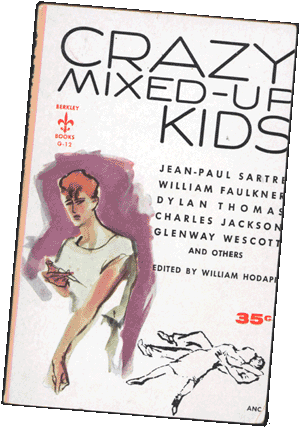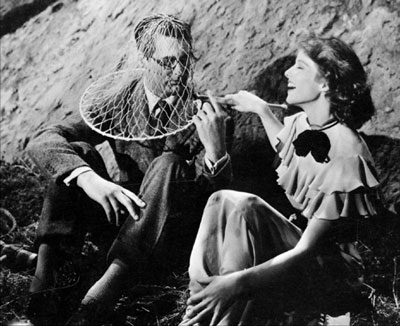
| Responses welcomed |
 |
|
||
|
|||
| . . . 2003-11-25 | |||
To Sir, With Cat Head
I've read a study that showed evaluations of teachers by students to be basically fair, and I believe it.
Without discomfort, I also believe the testimony that evaluations are an extortionist distraction from the real job of education.
But only if tit meets tat on common ground. Merely providing new opportunities for injustice doesn't make an institution more just, and powers can't be balanced when they're measured by different coordinate systems.
In my high school, for example, woe unto the teachers who counted on the power of grades to balance the power of physical and verbal aggression. (Woe including beatings, nervous breakdowns, and deliberately engineered epileptic fits.) And the uncorrelated rankings of the athletic department and academic standards twine like old ivy over the largest universities.
To pit evaluation against grading is like saying, after an earthquake, that the building attacked the sidewalk. Under the rubble lies a spectacularly active fault line between two incommensurate value systems: money and scholarship.
To stereotype from extremes: Whether financially desperate or pampered, today's students flame with the righteousness of the betrayed consumer, quick to attack as "elitist" anyone who would have them become less comfortable, understandably resentful of anyone who gets in the way of their loans. Today's teachers still wield nominal authority, but, given their low wages and job insecurity, may be treated more like surly bungling servants.
Today's -- and yesterday's as well, this innovation being more or less a return to the upper-class 18th-century educational stereotype of mocked tutor and abused governess, a stereotype which held even in the American university of that time....
| . . . 2003-11-26 |
In 1870, the political career of Henry Adams detoured into academia.
Characteristically, he made himself at home on his new perch by sawing at the limb. Having become a Harvard professor and the editor of a leading scholarly journal, for his first major article in that journal, he ransacked his distinguished grandfather's diaries and printed, with acidulous glee, the most embarrassing notes he could find from John Quincy Adams's two years at Harvard College:
However that may be, the syllogists all got together this evening and drank till not one of them could stand straight, or was sensible of what he did. A little after 9 they sallied out, and for a quarter of an hour made such a noise as might be heard at a mile distant. The tutors went out and after a short time persuaded them to disperse. Mr. —— had two squares of his windows broke.... Borland, it seems, was the most active of them all; he collared Mr. —— and threw an handful of gravel in his face, and was rather disrespectful to Mr. ——.This excerpt may help to explain the hostility:
Here are a few additional Harvard memories which escaped publication in 1872:May 3d, 1786We had after Prayers a Class meeting, about making a present to our Tutor. It is customary at the end of the freshman year to make a present to the Tutor of the Class: but it has been delay'd by ours to the present Time, and many would still delay it, and lay it wholly aside. The Custom, I think is a bad, one, because, it creates partialities in a Tutor, because it increases the distinction between the wealthy, and the poor Scholars, because it makes the Tutor in some measure dependent upon his Class, and because to many that Subscribe it is a considerable expence, but the Salaries of the Tutors, being so low, and it having been for many years an universal custom, I am sorry to see our Class so behind hand, and several, who could well afford it, and have really subscribed, meanly endeavouring, to put off the matter from Quarter to Quarter, till they leave College.
|
August 17th, 1786Drank tea with Mead in his Chamber which is contiguous to mine. The Club are quite in a Dilemma, how to do since the boys are sent off. They are unwilling to send Freshmen, and think it beneath their dignity to go themselves for what they want. At about 10 o'clock this evening, Stratten, a crazy fellow came, and knock'd at my door; just as I was going to bed; I opened it, and he ask'd me for some water; I told him I had none, and shut the door upon him: "Damn you, says he, do you refuse a man a little water." After thumping two or three minutes at the door, he went away, knock'd at all the doors in the entry; ran up and down stairs, came again, to my door and stamp'd at it, and finally ran to the window in the entry, push'd it up, and leapt immediately out of it. I instantly got out of my bed, went to my window, and saw him lying on the ground. After 3 or 4 minutes he began to groan "Oh! I've broke my leg." Charles had not gone to bed; I desired him to go and call up Dr. Jennison; who immediately came out. The fellow complain'd in the most doleful manner. However, after examining his leg, (for he was not at all hurt any where else) the Doctor said, there might be a bone crack'd but that none was displaced. It was with a great deal of difficulty that we were able to get Stratten, into one of the lower Rooms which is empty. He persisted for two hours in attempting to walk, for in addition to his State of mind, he was then as drunk as a beast.
|
May 30th, 1787Election day. About two thirds of the Students went to Boston. Those of us who remain'd pass'd the day, in amusement; I was at Cranch's chamber the whole day. The Sophimore Class with their civil Officers at the head march'd in procession to the Hall, and as soon as they came in a pistol was fir'd by their governor. The same ceremony was repeated after commons were over. In the evening they were at Thomas's chamber, much intoxicated and very noisy. Dr. Jennison paid them a visit at nine o'clock, and sent them all to their chambers.
|
May 31st, 1787
The Sophimores are very fearful that their yesterday's conduct has brought them into difficulties. Mr. Reed, who found his door broken through, when he return'd from Boston, is very much incensed and will probably, take measures to discover the persons who offered the insult. Mr. Williams gave us a lecture upon a number of optical instruments. I trifled away this day.
|
The younger Adams claimed that his goal was to help the reader "obtain a correct idea of the gradual steps by which the standard of high education in America has been slowly raised," and I suppose I must have something similar in mind.
| . . . 2003-11-28 |
"... poets and artists in reviving a more living sense of our moral traditions are political in that way -- cleansing the air."
|
Regarding the ever-fresh topic of political art, I recommend scooting on over to the Sacramento Bee to listen to Maria Shriver's Maya Angelou reading at the inauguration of Herr Governor Schwarzenegger.
Even in a politician's wife, rarely have I heard fear so tightly corseted. But her strangled dignity reaches Story of O levels at the lines:
"... whose hands can strike with such abandon, that in a twinkling, life is sapped from the living. Yet those same hands can touch with such healing, irresistible tenderness, that the haughty neck is happy to bow and the proud back is glad to bend."That truth was perhaps a little too brave and startling, since she then stumbles:
"Out of such chaos, out of such contradiction, we learn that we are neither devils nor divines. When we come to it, we this people, on this wayward floating body, created on this Earth, have the power to fashion for this Earth a climate where every man, and every woman, can live freely without sanctimonious piety and without --Where Shriver stumbled, of course, was at "crippling fear." Which she replaced with the improvised equivalent, "enduring history," an easier thing to live without."Enduring history --
"When we come to it, we this people on this wayward floating body, created on this Earth, of this Earth, have the power to fashion for this Earth a climate where every man and every woman can live freely without sanctimonious piety, without crippling fear. When we come to it, we must confess that we are the possible, we are the miraculous, the true wonders of this world. That is when, and only when, we come to it."
In either case, one could say that she spoke truth to power, since Maria and Arnold, like Angelou's other admirers, would indeed be willing to confess that they are the possible, that they are the miraculous.
But why should speaking truth to power so often involve marriage to power and the duty, as hostess to power, of keeping attractive young women out of power's groping hands at public functions?
Well, that's where art comes into it.
This poem was written and delivered in honor
of the 50th anniversary of the United Nations.
© Maya Angelou |
| . . . 2003-11-30 |
 |
Collection of Juliet Clark |
| . . . 2003-12-05 |
I once had a creative writing teacher tell me that he didn't understand why authors used science fiction or magical realism to tell a story or impart a theme. Why do you think we do, when good old realism might do the trick?
"I sit with a philosopher in a garden; he says again and again 'I know that that is a tree,' pointing to a tree that is near us. A second man comes by and hears this, and I tell him: 'This fellow isn't insane: we're only doing philosophy.'"
--Wittgenstein, On Certainty
| . . . 2003-12-06 |
Reader Renfrew Q. Hobblewort comments:
Sir: I'll have you know Maria Shriver is 48, thus no fresh blossom in the manure garden of political life.We deeply regret any inconvenience.
| . . . 2003-12-07 |
Lawrence L. White extends the popular series:
Jessie Ferguson is okeh with lack of consensus in "pure aesthetics," but how are you going to keep it pure? & I'm not talking about keeping the non-aesthetic out of aesthetics: how do you keep the aesthetic out of sociology, history, etc?I like those questions.I have this idea (one that I can't explain or justify to any acceptable degree) that it's all about poesis, that is, "making" in a general sense, "creation," as in things made by humans. Things such as society. That the poem and the economy are variants (mostly incommensurate) of the same drive. That "I'm going to put some stuff together" drive. To go kill me that deer. To clothe my child. To flatter the chief. To exchange for some stuff that guy in the other tribe put together.
Does this insight have any practical application? Not that I relish exposing my reactionary tendencies (yet again), but among those practicing sociological versions of aesthetics, the cultural studies crowd, I'd like less of the scientistic model — let me tell you how things are!— and more of the belletristic model — here's something I wrote! I would like to practice good making in criticism. (& as an inveterate modernist, I'm willing to call obscure frolics good making.)
But what of socio-economics? Is that supposed to be more like a poem, too? Perhaps there are other models. If I can throw out another murky notion to cushion my fall, Wittgenstein seems to say as much when he speaks of "grammar." I always took that term to contain potential pluralities, as if every discipline had a somewhat distinct way of talking, of presenting evidence, making inferences, etc. Which is not to say everything goes. He also spoke of needing to orient our inquiries around the "fixed point of our real need." Not that there's much consensus on that. But let me offer a suggestion: the inability of the English Department to come to a "consensus" severely debilitates its ability to ask for funding. Because the folks with the purse do want to know what exactly it is that you do.
Let me try it from another angle, through another confusion, this time not even so much a notion as a suggestion. Allen Grossman, the Bardic Professor, once reminded us that "theater" and "theory" have the same root. He, too, seems not to have said something Bacon didn't know. Grossman, though, as a reader of Yeats & Blake, wouldn't take it where our Francis wants to go. Perhaps the Baron Verulam's heart might be softened by this plea: isn't the point of the socially inflected sciences to make things as we "would wish them to be"? For example, don't the "true stories out of histories" serve to help us order our current situation, despite Santayana's overstatement of the case? (John Searle once told us in lecture that the drive behind philosophy was nothing more radical than simple curiosity. I found the answer to be unsatisfying philosophically and reprehensible politically.)
To add a trivial one, though: Hasn't the English Department's problem always-already been self-justification? Poetry and fiction weren't very long ago exclusively extracurricular activities, and it takes a while to explain why it should be otherwise. Isn't jouissance its own reward? Or do students pay to be titillated and spurred forward by the instructors' on-stage examples? (No wonder consensus isn't a goal.)
| . . . 2003-12-08 |
I hope this scene makes it through rewrite (via Amygdala):
TAXI DRIVER: Sorry, CATHERINE ZETA-JONES, but we are in a traffic jam that has dramatically sprung up in order to create dramatic tension.pseudopodium.org suddenly climbs on top of the roof of the taxi.
pseudopodium.org: (yelling) Only set in such a labored farce could passivity seem so compelling.The other cars, hearing what pseudopodium.org has to say, suddenly all pull over and let the taxi through. |
| . . . 2003-12-13 |
David Auerbach writes:
... as far as LL White's words go, I do find it interesting (in purely non-judgmental fashion!) exactly how mind-independent the grammars of humanities academics have become. I.e., to see a "grammar" of study where interpretation of what the words actually mean is so pluralistic as to have no significance to the work itself, and thus most purely embody Wittgenstein's concept of a language not being able to contain a meaning /intended/ by the speaker, you would go straight to technical academic work. I don't just mean the cultural Marxist stuff spouted by Jameson, but someone like Marjorie Perloff, for whom the placement of certain key terms ("private language" comes to mind) in seemingly arbitrary fashion acts as legislation of the use of those terms in future theses, dissertations, and books--again, without having any logical derivation from the past or to the future! (Logic and rationality being the writer's intention, not an intrinsic property of the writing.) I don't see "consensus" as being on the menu any more than "argument" is (both being elements of rational discourse); there is only the grammar.(See also.)I don't mean this as an exaggeration or a caricature: spend some time in the more happening fields of the humanities and there's a noticeable lack of good arguments.
What scares me is how little self-justification seems to exist these days, not how much. Those able to promulgate the grammar in productive (vs. non-productive) ways are accepted into the fold and the game continues, with very little heed paid to what material sustenance is required to keep the game going. Reality should intervene in the next decade or two and remove many of the participants, and our assistance isn't required there.
But I don't feel especially happy after talking about this stuff, so onto "In the Shadow of the Oversexed Women"!
| . . . 2003-12-15 |
|
I don't speak of entertaining you, or shewing you sights, which I think is a poor compliment to a man: here are books, and you may do as you please.
- Edward FitzGerald to W. B. Donne
Oct. 6, 1834 |
| . . . 2003-12-17 |
| "When a man is wrestling a leopard in the middle of a pond, he's in no position to run." | |
 |
Writing formal verse is like playing romantic comedy with the net down. |
| . . . before . . . | . . . after . . . |